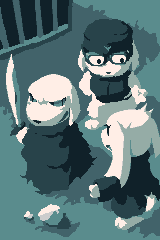I’ve been wanting to write about a couple different things for awhile now, but this post isn’t about them.
I’m playing Cave Story again. This marks the sixth time I’ve started a new game, and if I beat it, it will be my third time doing so on Normal difficulty. Technically, I’ve already beaten it this go-round with the “bad” ending, but I digress; it’s still a helluva lot of fun.
I’ve also recently been reminded of the existence of a certain segment of the Final Fantasy VII fanbase that is obsessed with analysis. It’s a segment I take with a grain of salt since, having dealt directly with them before, I’m aware that they can be blind to inaccuracy and sometimes prone to outright bias. It is a segment that exists to prove and argue, the type of group reminiscent of my early days at the FFVII Citadel: lots of debating, theories being tossed around, and so on. FFVII itself is a magnet for theory tossing—not only because of its shoddy translation, but also due to its haphazard production history and its familiar yet fantastical globalist, capitalist, biotech cyberpunk world.
 Other, more recent favorites of mine—especially Cave Story and Halo—also have interesting worlds and behind-the-scenes stories, but aside from doing some bits of fanart, I’ve managed to avoid getting involved with the fandoms. I’m sick of debates and analyzing the deeper meaning of what are really inconsequential things. When I get a certain item in Bushlands/Grasstown in Cave Story, it has amusing implications, but I’m not about to write a lengthy diatribe about why it wound up in the protagonist’s pocket. Similarly, I don’t care so much about the true purpose behind, say, the Super Sweeper in Final Fantasy VII. A little speculation every now and again is fine, and can even be fun, but that’s as far as I’m willing to take things.
Other, more recent favorites of mine—especially Cave Story and Halo—also have interesting worlds and behind-the-scenes stories, but aside from doing some bits of fanart, I’ve managed to avoid getting involved with the fandoms. I’m sick of debates and analyzing the deeper meaning of what are really inconsequential things. When I get a certain item in Bushlands/Grasstown in Cave Story, it has amusing implications, but I’m not about to write a lengthy diatribe about why it wound up in the protagonist’s pocket. Similarly, I don’t care so much about the true purpose behind, say, the Super Sweeper in Final Fantasy VII. A little speculation every now and again is fine, and can even be fun, but that’s as far as I’m willing to take things.
Say I’m getting old or whatever, but in the more than ten years that I’ve been in online fandom circles (mainly video game-related ones), I’ve found that overanalysis can get in the way of enjoyment, and that the franchise owners are more than willing to give fans too much of a good thing, if only they ask loudly enough. When a game’s obscurities become “clearer” through books and interviews, even when handled well, the loss of what was previously left unsaid can be disquieting if you’ve given such obscurities any thought at all, and outright infuriating if you’ve obsessed over it. This is especially true of sequels and spinoffs, such as StarCraft II, in which the deliciously vague became cold hard fact. Amongst its other crimes, Dirge of Cerberus: Final Fantasy VII pulled a similar stunt, in large part by giving ample screen time to Lucrecia, a minor character in the original game. Portal 2 did right by Chell and GLaDOS, but altered the DNA of its single most important character: Aperture Laboratories itself.
Don’t get me started on Chrono Cross.
If this is what the fans want, it can only mean that they refuse to embrace their own imaginations, wanting absolute answers. The problem is that all this does is settle some arguments on the internet. Those of us who happen to like imagining the unseen in our games lose something in the process. Not everything has to be concrete.
So to the obsessed fans: dig and analyze and argue all you want, but once that long-awaited sequel or interview comes out, don’t be surprised if you find yourself underwhelmed. Nowadays, I prefer to enjoy my games (and manga, and so on) at face value and not sweat over a heavily researched dissertation on the canon. They’re more fun that way, be they a fresh experience or one which I’ve loved for over a decade.